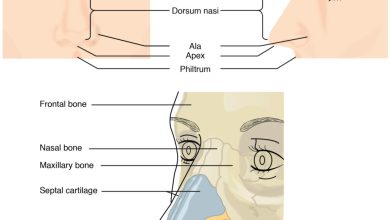Thyroid Cancer – How to detect? Symptoms and Prognosis

Want to know the signs and symptoms of thyroid cancer?
Thyroid cancer originates in the thyroid gland. The thyroid gland which plays a vital role in maintaining body’s metabolism by producing hormones, is located below the Adam’s apple at the base of the neck.
This article highlights everything about thyroid cancer, and how to detect it. So, you will get ideas about the treatment process. So, let’s dive in to know more!
Thyroid Cancer
Thyroid cancer is a disease that affects the thyroid gland, which produces hormones responsible for regulating body metabolism. When cells starts growing abnormally in the thyroid gland, there can be chances of developing thyroid cancer.
There are two main types of this type – papillary and follicular- though they can come in many forms depending on how it progresses; some cases may not show any symptoms until the late stage when invasive carcinoma has already spread beyond the area blocked off by nearby tissue. It can occur to anyone above 30, irrespective of gender.
Types of Thyroid Cancer
Primarily thyroid cancer can be of four types. However, the problematic part is that, it does not manifest itself through any symptoms in the early stages. For this reason, it is important to be aware of the potential signs and symptoms of thyroid cancer so that you can seek medical attention if necessary. Following are the types of thyroid cancer:
Papillary Cancer
This thyroid cancer accounts for about 80% to 85% of all diagnosed cases. It also has a high cure rate, among the most manageable types!
Follicular Cancer
Follicular cancer otherwise known as Hurthle cell thyroid cancer, typically occurs with Hurthles gene mutation. Though a rare form, however, it is quite precarious since it can invade into other parts of the body through the blood stream. It has an aggressive nature of progression.
Medullary Thyroid Cancer
It affects less than 3%of all cancers and may spread to nearby lymph nodes, but it’s very serious if not treated properly with surgery or radiation therapy!
Anaplastic Thyroid cancer
Thyroid cancer has a worse prognosis and becomes more resistant to Chemotherapy as it progresses. This category also known as “Anaplastic cancer” is prevalent among less than 2% of patients suffering from thyroid cancer.This type advances quickly with the most aggressive.
Symptoms of Thyroid Cancer
You must visit a healthcare professional in case you observe any of these symptoms. In some cases, these symptoms may be caused by a benign (non-cancerous) condition, such as an enlarged thyroid gland (goiter). However, only a medical professional can make an accurate diagnosis. Some common signs and symptoms of thyroid cancer include:
A lump or swelling in the neck, jaw, or throat
A continuous cough that is not otherwise caused as a result of any infection of respiratory tract or due to cold.
Difficulty swallowing
Hoarseness or changes in the voice
Pain in the neck or throat
Swollen lymph nodes in the neck
Risk factors
Not only do women have a higher risk than men of developing thyroid cancer, but they also experience it at an earlier age. The National Cancer Institute reports that the factors associated with being female and having developed this disease include being between 20 -35 years old, especially if you’re overweight.
Radiation exposure can lead to thyroid cancer. People exposed to Chornobyl had higher disease rates, but it’s hard for researchers to predict exactly how long this effect will last.
Goiter has been there since ages and still prevalent amongst people. People with a family history of goiters or thyroid cancer often notice that they have an enlarged neck as children before their symptoms show up on ultrasound exams.
If you or someone in your family has been diagnosed with medullary thyroid cancer, a blood test is available to check for the RET gene mutation. The chance of having medullary thyroid cancer is higher if you have a family member with the condition.
Iodine deficiency is the risk factor for follicular thyroid cancer, leading to cachexia and hypothyroidism.
Stages of Thyroid Cancer
Thyroid cancer has four stages of development. They are:
Stage I: The cancer remains intact and has not spread outside the thyroid gland.
Stage II: The cancer starts growing and has spread to nearby tissues but not to lymph nodes.
Stage III: Cancer has spread to the lymph nodes in the neck or other organs.
Stage IV: Cancer has spread to several other body parts, such as the lungs or bones.
Prognosis and Treatment of Thyroid Cancer
If detected early, the chances of survival is fairly high. According to the American Cancer Society, the five-year survival rate for all stages of thyroid cancer is about 98%. However, this varies depending on the stage and type of thyroid cancer.
For example, the five-year survival rate for stage I papillary thyroid cancer is 100%, while the five-year survival rate for stage IV papillary thyroid cancer is only 50-60%. The prognosis also depends on other factors such as age, gender, and overall health.
The type of treatment will depend on the stage and type of thyroid cancer. The goal of treatment is to cure cancer or keep it from spreading. In most cases, treatment is successful in achieving this goal. However, some people may experience recurrence (the return of cancer) or metastasis (the spread of cancer to other body parts).
Most thyroid cancers can be treated with surgery, radiation therapy, hormone replacement therapy, external beam radiation, or Chemotherapy. Typically, surgery is preferred as the first line of treatment while treating thyroid cancer. Radiation therapy may treat residual cancer after surgery or certain types of thyroid cancer that cannot be removed with surgery. Chemotherapy is seldom used for treating the disease.
Conclusion
If at all you are familiar with any of these signs do not miss to visit an oncologist for the cure. Dr. Kanury Rao, the well-renowned immunologist and cancer specialist, and his team will help you through this difficult time. With proper treatment and monitoring, the prognosis for thyroid cancer is generally good and curable. Thanks for reading!
Apart from this if you are interested to know about Proper Diagnostic Center then visit our Health category.




